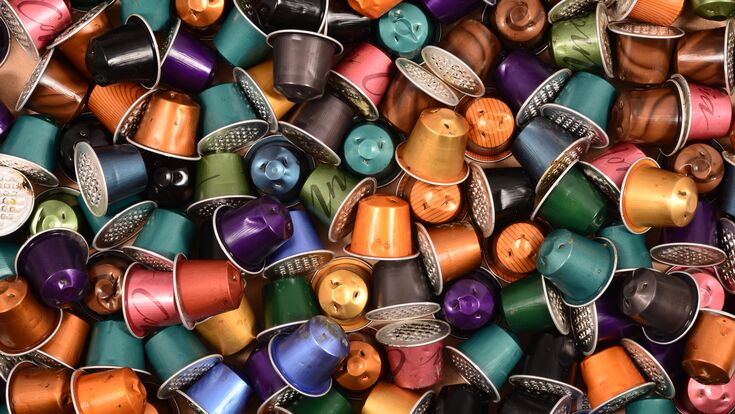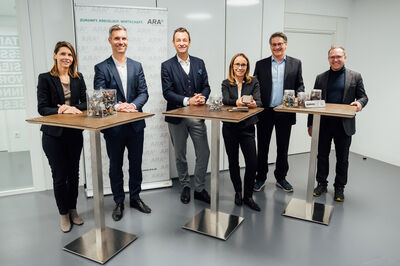How to recycle coffee capsules - coffee brew included. : Pilot project to easy collect and recycle coffee capsules

Altstoff Recycling Austria AG (ARA), together with the Austrian Coffee Association and leading coffee producers, shows how circular economy works: Together they are optimising the material cycle of coffee capsules in order to use them as secondary raw materials for new products. A pilot project was launched in the Styrian market town of Gnas to increase the amount of capsules collected. With success: through incentives, digitalisation and with the help of collection bags and bins, the amount of coffee capsules collected per day could be increased to 2.5 times. The capsule's journey does not end at collection: the aluminium and plastic capsules are recycled. The coffee grounds are used as biogas and, more recently, as a material in furniture production, as a current ARA research project with the Salzburg University of Applied Sciences - Kuchl Campus shows.
ARA has already been operating successful systems for the collection and recycling of coffee capsules with the coffee producers Nespresso and Tchibo for years. ARA is currently testing a joint future solution for all capsules in a collection trial.
Digital reward system motivates capsule collection
By means of cross-manufacturer collection containers and digital incentives, the amount of coffee capsules collected in Gnas has been significantly increased since May 2022. To this end, ARA, together with the Austrian Coffee Association and with the support of leading coffee manufacturers such as Nespresso, Tchibo, Jacobs Douwe Egberts, Julius Meinl, and Lavazza, created a new collection system for coffee capsules. Until the end of 2022, consumers in the Styrian municipality can collect the aluminium or plastic capsules in a standard recycling bag and hand in the full bags in their own green collection bins for coffee capsules at participating trade partners or at the Gnas waste material collection centre.
The collection campaign is accompanied by a digital incentive system: "Coins" are collected via the incentive-based app Digi-Cycle, which can be exchanged for attractive rewards. In addition, a community goal motivates the users during the collection: if enough capsules are collected, ARA sponsors a new nest swing for the Gnas crèche. Incentives supported by digitalisation and the community goal strengthened the motivation of the population to collect, as also shown by the rapid achievement of the challenge for the crèche. The first results are also impressive: The amount of coffee capsules collected has increased 2.5 times compared to the amount before the pilot. "The pilot test confirms that even more raw materials can be recovered for recycling through the expansion of separate collection, the expansion of the collection infrastructure and digital incentivisation," says ARA Board Spokesperson Harald Hauke.

Successful recycling of coffee capsules
The capsule's journey through the closed material cycle continues after the collection of the recycling bags to sorting. In the plants, the capsules are sorted according to the type of material.
In the sorting plants, the capsules are sorted according to the type of material, aluminium or plastic, and the remaining coffee grounds are energetically processed. Aluminium capsules are melted down in aluminium smelters and, for example, made into bicycles, beverage cans or even new capsules. Polypropylene granulate is obtained from the plastic capsules, which is also used as a recyclate for new products such as garden furniture or watering cans.
Coffee has great potential as biogenic waste
Biogenic waste is becoming increasingly important in the raw materials and energy industries. In addition to its use as biogas, coffee brew is also suitable for the production of new furniture, as a research project by ARA in cooperation with the Salzburg University of Applied Sciences - Campus Kuchl shows. The FH Kuchl is conducting research in the field of wood and biogenic technologies on the new development of materials. This includes the use and combination of different materials and is intended to promote a circular use of resources. In the research project with ARA, coffee brew served as the material for a table top. Two of these tables have now been handed over by ARA to Nespresso and Tchibo as a thank you for their cooperation. "We are specifically committed to the intelligent use of resources, including the development of new recyclables from biogenic residues. The tabletop made from coffee brew is an answer to raw material bottlenecks," says Alexander Petutschnigg, Head of the Department of Green Engineering and Circular Design, Campus Kuchl, about the cooperation with ARA.
